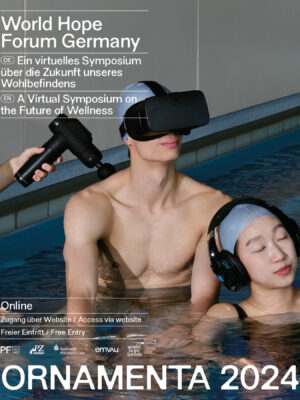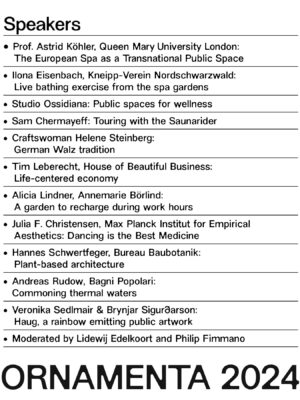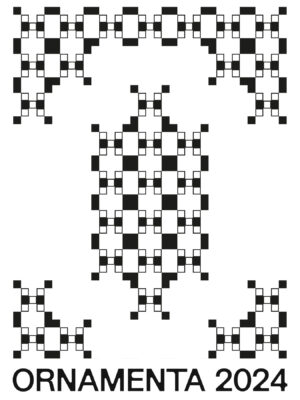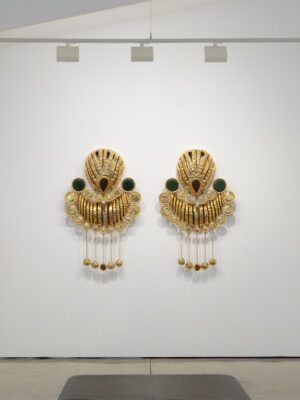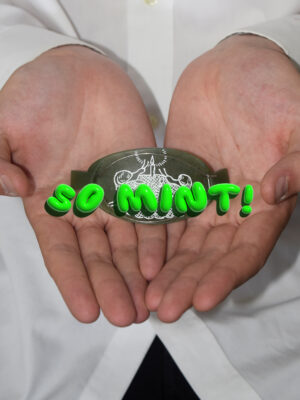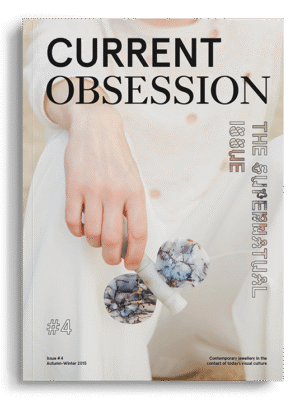About
Held first in 1989, Ornamenta returns in 2024 as a platform for contemporary cultural development, which takes place through site-specific exhibitions, public installations, and events. Local citizens, curious neighbours, and adventurous national and international visitors are invited to discover the Northern Black Forest area through different exhibition routes set out by Ornamenta. The Northern Black Forest region includes the cities of Pforzheim, Calw, Bad Wildbad, Nagold, and Maulbronn, and is a popular destination for nature tourism. Besides its perpetual natural beauty, the region is also home to jewellery industries, small spa towns, and a rich variety of people, communities, and cultures.
Ornamenta literally blurs the borders of the region. Between July and September 2024, existing municipal districts will be replaced by five thematic neighbourhoods–Gemeinden in German–each investigating specific topics that are of local and European significance. These new Gemeinden, named Schmutzige Ecke, Zum Eros, Inhalatorium, Bad Databrunn, and Solartal, address and articulate issues that affect people across all layers of society. From sunshine and access to clean air to social taboos and technology, every Gemeinde is a site for interaction. Ornamenta is a platform for local communities and clubs to engage in partnerships with international creatives, for heritage institutions to meet progressive artists, and for designers to propose new ideas to industries in the region.
The Ornamenta programme is composed of five thematic exhibitions, one for each Gemeinde, along with newly commissioned public artworks, and various events such as listening sessions, tasting events, talks, and collaborative performances. The curatorial team selected artists and designers with a focus on emerging talent, fostering opportunities for new generations of creatives, artists, and social organisations. Artworks and design objects are shown in unconventional locations, transforming the Northern Black Forest into a meeting place for the culturally curious–tightening relationships between local, national, and international audiences.
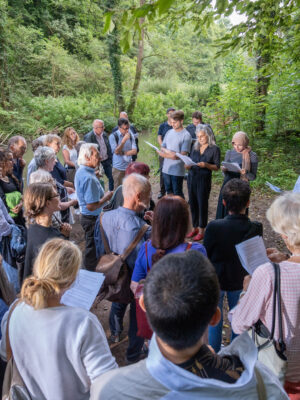
Curatorial Highlights
Black Forest based retailers, companies and entrepreneurs worked with curator Willem Schenk and carefully selected upcoming international designers, fashion experts and jewellery makers on projects giving new entrepreneurial perspectives. For instance a newly made seasonal commodity: the Black Forest Cake in the form of a cocktail, with a longer shelf life than any fresh cake, can be experienced in a series of tasting events. Or for example prototypes and services that enable transforming society from self-centred to sun-centred, shown in a group exhibition around a luminous courtyard.
Clubs, communities, grass-root organisations and schools based in the Black Forest worked with curator Katharina Wahl and upcoming socially engaged creatives on projects giving new societal perspectives. For instance a yard for intimacy, botany, and health constructed on a historical pharmacy garden. A water bar with educational purposes informs visitors about flows and regulations of our bodily fluids. Find also a series of listening events in a healing cave, where the youth culture around hookah pipes is tied in with the regional air spa towns.
Regional museums, heritage sites, art collectors and property developers worked with curator Jules van den Langenberg and upcoming European artists on site-specific works, giving new autonomous perspectives on the Northern Black Forest. For instance a public artwork merging craft and technology to occasionally emit rainbows over the river Enz. A park-like public space is reconfigured from abandoned architectural fragments, local leftover materials, and newly designed elements. A performance series throughout forested landscapes and timber-framed historic villages makes us aware of the air we share.
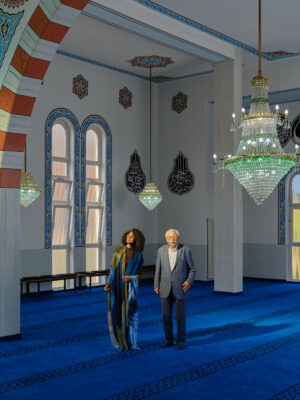
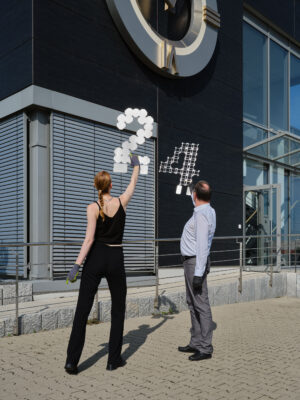
Solartal
Solartal celebrates the region’s reputation as one of the sunniest parts of southern Germany. Paying homage to our sun as a symbol for brighter futures, we look into paths connecting the Northern Black Forest to places beyond. Perrot, the Calw-based clock manufacturers, present a fresh take on their couture of clock production with typographer and feminist Charlotte Rohde through a sundial designed for the public as well as homes and offices. Dutch designers Buro Belén interact with regional and Paris-based company La Biosthétique, creating an open-air Solar Salon. Blending forward-thinking material research with holistic approaches to living with the sun, they create a pavilion for new beauty rituals and solar gatherings.
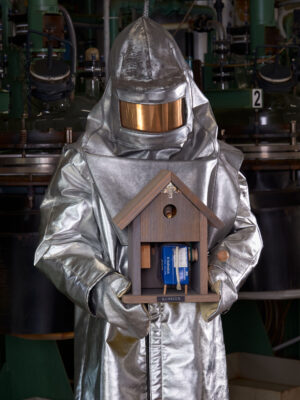
Schmutzige Ecke
We confront taboos, uncover dark secrets, celebrate labour and circularity in the Schmutzige Ecke. Small-scale local breweries and young designers, art-directed by Henriette Waal from Atelier Luma, explore the future of beer drinking. Alumni from die Das Design Akademie Saaleck reflect on objects with a dark history and shed light on uncomfortable monuments. A public artwork by Berlin-based design group Spazio Cura negotiates old and new architecture, repurposing found fragments of buildings from the region to demarcate a park that will host native plant species in the middle of a new residential neighbourhood.
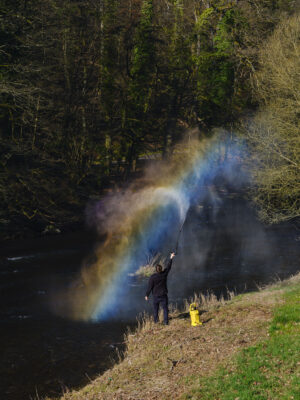
Bad Databrunn
Bad Databrunn presents future-oriented spa towns as the antidote to a society close to burnout. It is a haven for digital detoxes, allowing us to reflect on our relationship with the virtual realm. The vocational training organisation BFW, from the regional spa town Bad Wildbad, opens a Library of Bodily Fluids in collaboration with Pforzheim’s School for Goldsmiths and Clockmakers and the WaterSchool by studio Makkink & Bey. German-Icelandic artist duo Veronika Sedlmair and Brynjar Sigurðarson reveal a new public artwork, a mist-emitting sculpture at the river Enz that creates an artificial rainbow at the right time of the day.
A Virtual Symposium on the Future of Wellness
The demand for ways to deal with stress, both virtual and in real life, is at an all-time high. For centuries, Germany has embraced the concept of “Kur” (Spa), a holistic approach to healing that emphasises spending time in nature, utilising thermal waters and fresh air. While the privatisation of the German spa industry in the nineties may have made these traditional experiences less accessible, different initiatives are breathing new life into this tradition. Join Germany’s inaugural World Hope Forum, where various speakers showcase how design, architecture, science, activism and craft draw inspiration from this heritage to create solutions for fatigue and isolation. The World Hope Forum is a virtual symposium that aims to unite major players who have pioneered new, more ethical industrial and economic processes, prioritising people. Ornamenta 2024 collaborates with trend forecasters Lidewij Edelkoort and Philip Fimmano, striving to establish a comprehensive global platform for exchanging knowledge and fostering innovation.
Sign up for free here.
View the full programme here.
More information:
@ornamenta2024 @worldhopeforum
Curatorial team:
Katharina Wahl, Willem Schenk,
Jules van den Langenberg
Managing Director:
Dr. Christian Saalfrank
Duration:
5 July – 29 September 2024
Opening hours:
Friday – Sunday
10 am – 8 pm
Opening weekend:
Preview: Thurs. 4 July 2024, 8 – 10 pm
Opening ceremony: Sat. 6 July 2024, 12 – 1 pm
First day open to public:
Fri. 5 July 2024, 10 am – 8 pm
Cover image:
Artist Elise Ehry in the Black Forest.
Photo by Lonneke van der Palen.
Graphic design:

